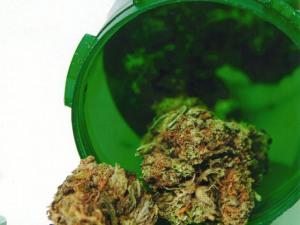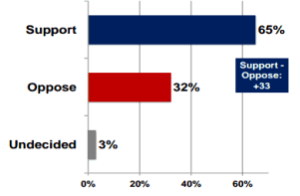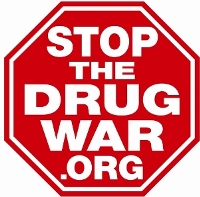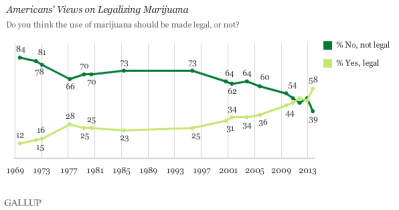We are attending the 2013 International Conference on Drug Policy Reform, in Denver, Colorado, for the next few days.
What does the future hold for medical marijuana in Washington state? It's looking kind of ominous right now after state officials issued draft regulations that would wipe out home grows and many dispensaries. But there's going to be some pushback.
In the latest sign that marijuana legalization is at the tipping point, a new Gallup poll has support at 58%, up a dramatic 10 points from last year.
A new poll has support for marijuana legalization at 65% in California. The pressure to not wait for 2016 is bound to mount.
California Lt. Gov. Gavin Newsom will lead a high-powered panel of experts on a mission to study the best way to legalize marijuana in California. They're aiming at 2016.
Marijuana seeds will be legal in Slovakia starting next year. Just don't grow anything with them because the plant itself will remain illegal.
An Indianapolis man is dead after police said he refused to drop a weapon as they raided his apartment in a dawn drug raid.
Now more than ever, StoptheDrugWar.org needs your financial support to continue to provide this crucial informational tool that builds and empowers the movement. We have a special new offer for those donating $50 or more, which this post provides some updated information about.

opening plenary session
The Chronicle is shorter than usual this week, due to staff travel to Denver for the 2013
International Drug Policy Reform Conference. I am watching a panel on regulatory models for marijuana legalization from around the world. Earlier in the morning we go to here US congressman from Boulder Jared
Polis, Rev. Edward Sanders, Ethan
Nadelmann, and others.
We look forward to publishing original reports from the conference over the next few days. I am also looking forward to Saturday night when Phil Smith, the primary writer for this newsletter, receives the Edward M. Brecher Award for Achievement in Journalism.
back to top
The three state agencies and the governor's office that constitute the state's medical marijuana working group on Monday released their draft recommendations for dealing with medical marijuana in the era of legal marijuana possession and state-licensed marijuana stores under the I-502 initiative. Their recommendations would essentially gut the existing medical marijuana system, and patients and advocates are crying foul.

What's the future for medical marijuana in Washington?
The recommendations from the State Liquor Control Board (which is in charge of implementing the I-502 regime), the Department of Health, and the Department of Revenue would allow state-registered patients to purchase tax-exempt marijuana from the 334 stores envisioned under I-502, but would also reduce the amount patients could possess from 24 ounces to three ounces, require doctors to register patients with the state, remove the affirmative defense for medical marijuana patients, and end the right to petition for new medical conditions to be added.
The recommendations also call for eliminating the right of patients to grow their own, either individually or collectively, require existing dispensaries to comply with I-502 regulations, and force out of business those that can't. That would bring the state's medical marijuana system in line with I-502's no home grow provision.
While I-502 only envisions legalizing marijuana for adults 21 and over, the recommendations would allow 18-to-20-year-olds to use medical marijuana, but patients under the age of 18 would only be allowed to use it with parental consent and could only possess one dose at a time.
The state agencies will make their final recommendations by January 1, when they must send a final report to the state legislature, but in the meantime, they are taking for public comment between now and November 8. They can expect to get an earful from an angry medical marijuana community.
"Washington was one of the first states in the nation to recognize that patients under a physician's care have the right to use medical marijuana," said Steph Sherer, executive director of Americans for Safe Access (ASA). "The needs of this vulnerable population are distinctly different from the wants of recreational users and it's vital that elected officials understand the difference."
ASA, which worked with local activists to create the Health Before Happy Hour campaign to try to ensure that medical marijuana patients don't get run over by the legalization bus, is also holding a series of stakeholder meeting to mobilize the community and protect what it views as its hard-won rights. Those meetings will be held between October 27 and 30 in Bellingham, Olympia, Seattle, Spokane, and Yakima.
ASA created that campaign in part because of ominous portents coming from state officials and other key players. In May, Liquor Control Board spokesman Brian Smith warned that competition from the medical marijuana market will pose "a challenge" to the viability of the state's new recreational program, while state Rep. Chris Hurst (D-Enumclaw), chairman of the House Government Oversight and Accountability Committee, more recently called the medical marijuana industry "a sham," and urged the task force to recommend that all of the state's dispensaries be shut down.
Then, Mitch Barker of the Washington Association of Sheriffs and Police Chiefs chimed in to claim that "the two (laws) are not going to be able to exist side by side for very long." As if that weren't enough, the DEA continues to raid dispensaries, and US Attorneys continue to menace patients and providers. US Attorney Jenny Durkan qualified the state's medical marijuana system as "untenable," and vowed to shut down the dispensaries.
"We are living with HIV/AIDS, end-stage cancers, epilepsy, multiple sclerosis and other serious, often painful and debilitating diseases," said Paul Feldman, who experiences relief with the help of medical marijuana. "It is wholly inappropriate to force us to get our medicine from anything resembling a liquor store and equally unacceptable to make patients pay an excise tax," continued Feldman. "No other medication is taxed this way and cannabis shouldn't be either."
Instead of gutting the medical marijuana program, the Health Before Happy Hour campaign is calling for a system of state-licensed and regulated dispensaries outside the scope of I-502. The campaign is supporting legislation similar to Senate Bill 5073, the proposal previously sponsored by Sen. Jeanne Kohl-Welles (D-Seattle) which was partially vetoed in 2011 by then-Governor Christine Gregoire (D).
[For extensive information about the medical marijuana debate, presented in a neutral format, visit MedicalMarijuana.ProCon.org.]
back to top
Support for marijuana legalization is at the highest levels ever, with 58% of Americans in favor, according to a Gallup poll released Tuesday. That's up an impressive eight points from 2011, when Gallup had 50% supporting legalization, and even more impressively, up 10 points from last year, when support had dipped to 48% in the annual poll.
The poll results are generally in line with
other polls in the past couple of years that have shown half or more of Americans are ready to free the weed. As Gallup's own annual polls suggest, after support for legalization stayed around one-quarter of the population in the
1980s and
1990s, momentum has picked up since the turn of the century. Then, only 31% supported legalization; now nearly double that number are ready for it.
Gallup pointed at movement toward support of legalization by independents, now at 62% and up a big 12 points since last year. Support also increased among Democrats, from 61% to 65%, while among Republicans, only 35% favored it, although that, too, was up over last year, by a couple of points.
The pollster also singled out strong support among younger Americans and rapidly increasing -- although still not majority -- support among senior citizens. Two-thirds (67%) of 18-to-29-year-olds said legalize it, as did 62% of 30-to-49-year-olds and 56% of 50-to-64-year-olds. Only 45% of seniors agreed, but that was up a whopping 14 points over 2012.
Gallup offered several explanations for the upswing, including the victories in Washington and Colorado last year, the Obama administration's relatively soft-shoe approach to the matter, and increasing social and cultural acceptance of the plant (a sizeable 38% admitted to having tried it), driven in part by medical marijuana.
"It has been a long path toward majority acceptance of marijuana over the past 44 years, but Americans' support for legalization accelerated as the new millennium began," Gallup said in summarizing the poll results. "This acceptance of a substance that most people might have considered forbidden in the late 1960s and 1970s may be attributed to changing social mores and growing social acceptance. The increasing prevalence of medical marijuana as a socially acceptable way to alleviate symptoms of diseases such as arthritis, and as a way to mitigate side effects of chemotherapy, may have also contributed to Americans' growing support."
It was all music to drug reformers' ears as they prepared to gather this week in Denver for the biennial International Drug Policy Reform Conference sponsored by the Drug Policy Alliance.
"The latest poll results point to the absurdity and even venality of persisting with harsh prohibitionist policies," said Ethan Nadelmann, the Alliance's executive director. "No other law is enforced so harshly and pervasively yet deemed unnecessary by so many Americans. Spending billions of dollars and arresting 750,000 people annually for violating marijuana laws now represents not just foolish public policy but also an inappropriate and indecent use of police powers to favor one side of a cultural and political debate."
"The American people have opened their eyes to the failure that is marijuana prohibition and there is no putting the genie back in the bottle. Following the successful passage of marijuana legalization initiatives in Colorado and Washington in 2012, the people of this country see that a new approach to marijuana policy is both required and possible," said NORML communications director Erik Altieri. "The majority of Americans agree that prohibition has failed and it is time to legalize and regulate. The issue can no longer be ignored or sidelined. Legalization is now the mainstream position and supporters of perpetuating our war on marijuana will continue to be further relegated to the fringe."
"The dramatically increasing support for making marijuana legal should come as no surprise," said Rob Kampia, executive director of the Marijuana Policy Project. "Marijuana prohibition has been an abject failure. Most Americans realize it is unjust, wasteful, and counterproductive to invest in the criminalization of adults for using a substance that is far less harmful than alcohol."
"The passage of adult-use marijuana initiatives in Colorado and Washington has demonstrated widespread disillusion with marijuana prohibition," noted Aaron Smith, executive director of the National Cannabis Industry Association. "The success of regulated medical and adult-use marijuana markets in 17 states and DC is replacing criminal enterprises with legal and responsible businesses that generate millions in tax revenue and tens of thousands of good jobs. It's no surprise that 58% of Americans now support bringing this regulated approach to all 50 states."
Both Kampia and Smith explicitly called on Congress to act to end federal pot prohibition, and Kampia said the poll "bodes well for efforts underway to change state laws around the nation." That may be an understatement. Let's check back in a on that a little bit more than a year from now.
back to top
Will California wait until 2016 to vote on legalizing marijuana? A poll released Thursday strongly suggests voters in the Golden State are ready to legalize it right now.

Should marijuana be legal? California says "yes."
The new
Tulchin Research poll has support for legalizing marijuana at just under two-thirds (65%), with only 32% opposed. It shows majority support for legalization among every demographic except one -- Republican Party members. Even among Republicans, support for legalization (47%) trailed opposition (50%) by only three points.
And this was not a generic legalization question. The poll asked: "There may be a measure on the ballot in the future to legalize, regulate and tax marijuana in California for adults. It would still be illegal for minors, there would be penalties for driving under the influence of marijuana, and it could only be sold in state regulated stores. The measure would tax marijuana and generate an estimated one billion dollars a year to fund schools, public safety and other essential services and there would be annual audits to ensure the money is spent as intended. Based on this, would you support or oppose this proposal?"
Geographically, support was strongest in the Bay Area (73%), followed by San Diego (67%), Los Angeles County and the Central Valley at 65%, Sacramento/North (63%), the Los Angeles Area (59%), and the Inland Empire (58%).
Among racial groups, support was strongest among blacks (74%), followed by whites (69%) and Asians (68%), with Hispanics lagging at 53%. Both men (66%) and women (65%) strongly supported legalization. So did all age groups, with the lowest level of support being 54% among 40-49-year-olds.
"In sum, voters strongly support a marijuana legalization and regulation measure for adults that includes penalties for DUI and collects revenues to fund public services," Tulchin said. "Furthermore, such a reform is supported by nearly all demographic subgroups across the state."
The poll comes as one 2014 marijuana legalization initiative is in the signature-gathering phase and a second is awaiting approval of title and ballot summary at the state attorney general's office. The conventional wisdom among deep-pocketed drug reformers is that California should wait until 2016, when a presidential election year generates higher voter turnout, which in turn favors liberal voting groups, but poll numbers like these are going to increase the pressure to get something done next year.
The poll was conducted on behalf of the ACLU of California, which also announced that it is putting together a high-octane panel to study marijuana legalization for the next two years, implicitly precluding a 2014 effort.
The Tulchin Research poll was conducted doing live landline and cell phone interviews with 1,200 November 2016 voters between September 26 and October 6. The margin of error is +/-3.1%.
back to top
California Lieutenant Gov. Gavin Newsom (D) will lead a blue ribbon panel of expert to chart a path toward marijuana legalization, the ACLU of California announced Thursday. At the same time, the group released polling results showing that two-thirds of California voters are ready to support regulated legal marijuana commerce that contributes to state tax coffers.

Gavin Newsom announces panel formation. (Rebecca Farmer)
"The prohibition of marijuana has had an enormous human and financial cost in communities across this state," said
Newsom, the highest ranking elected official in California to publicly endorse taxing and regulating marijuana for adults. "It is far past time for Californians take a serious look at smarter approaches to marijuana, and it is imperative that happen before any marijuana ballot initiative gets underway."
The panel will consist of academic, legal, and policy experts and "will engage in a two-year research effort," the ACLU said. That is a clear signal that organizers are aiming at 2016 -- not 2014 -- as the time to put the matter before voters, even though at least two separate 2014 marijuana legalization initiative efforts are already underway in the state.
"The panel's work will be designed to help voters and policy makers evaluate proposals for a strict tax and regulation system that will enable California to benefit from billions of dollars of new revenue while ensuring safe communities and protecting against underage use," the ACLU said.
Among those named to the panel are Keith Humphreys, a Stanford Health Policy Associate who was a senior policy analyst at the White House Office of National Drug Control Policy in 2009-2010; Erwin Chemerinsky, constitutional law expert and dean of the University of California, Irvine School of Law; two past presidents of the California Society of Addiction Medicine; Dr. Seth Ammerman, a Stanford University professor and member of the American Academy of Pediatrics; Santa Clara County Sheriff Laurie Smith; and Sam Kamin, a Denver University law professor who has been appointed to the Colorado governor's task force for implementing that state's marijuana legalization initiative.
Also included are Alison Holcomb, campaign manager of Washington state's successful 2012 ballot initiative to tax and regulate marijuana; Tamar Todd, staff attorney for the Drug Policy Alliance; Karen O'Keefe, staff attorney for the Marijuana Policy Project; and Neill Franklin, executive director of Law Enforcement Against Prohibition.
In addition to enhancing state revenue streams, marijuana legalization would end the extreme racial disparities in marijuana arrests in California, the ACLU said.
"Marijuana prohibition has harmed communities and families by needlessly ensnaring hundreds of thousands of people in the overburdened criminal justice system, with people of color far more likely to be arrested and prosecuted," said Allen Hopper, director of criminal justice and drug policy for the ACLU of California. "California voters recognize that it's time for change and will overwhelmingly support reforming marijuana laws provided it can be done responsibly with adequate safeguards and assurances that tax revenues will go to fund public schools and other important social services."
back to top
Marijuana seeds will no longer be illegal in Slovakia as of March 2014, according to a report in the Slovak Spectator. The decision came Wednesday in a proposal from the Health Ministry.

The Slovak capital, Bratislava (wikipedia.org)
While the move has yet to be confirmed by parliament and the president, the deed is considered as good as done because parliament is dominated by the
Smer Perty and President Ivan
Gasparovic is widely viewed as a
Smer ally.
The Health Ministry proposal says that pot seeds should not be considered controlled substances because they do not contain any psychoactive compounds. The law change applies only to marijuana seeds; the possession or cultivation of the plant will remain illegal.
Under current Slovak drug laws, possession of "personal use" amounts of any drug, including marijuana, is punishable by up to either three or five years in prison, depending on the amount. Amounts less than three personal doses earn the lower penalty, while amounts of up to 10 doses garner the larger penalty. Greater amounts trigger the Slovak equivalent of "possession with intent to distribute" charges, with stiffer penalties.
Slovak drug use levels in general, and marijuana use levels in particular, tend toward the lower side of European norms. Some 3.6% of Slovak adults, for instance, report using marijuana, compared with a European high of 10%. For young adults, the figures are 7.6% for Slovaks, compared to a European high of 18%.
back to top
Members of the Indianapolis Metro Drug Task force shot and killed a man early Thursday morning while serving a warrant. Jose Guerrero, 36, becomes the 34th person to die in UN domestic drug law enforcement operations so far this year.
According to
WISH TV, citing police sources, officers with the Carmel Police Department serving on the drug task force had entered an apartment in a Westside complex around dawn Thursday when Guerrero pulled out a gun and refused to put it down. They then shot and killed him.
"We had two veteran narcotics officers in this residence who did what they needed to do when they were confronted with an armed individual," said Carmel Police Chief Tim Green.
There is no word on whether the raid was a no-knock raid or not.
The raid was part of a two-year undercover operation known as "Operation Five Dollar Foot-Long," with the DEA, as well as state and local law enforcement, participating. On the day of the killing alone, police seized 100 pounds of marijuana, 1.5 pounds of methamphetamine, seven guns, 26 vehicles, and more than $80,000 in cash.
The two Carmel police officers involved in the Thursday morning shooting have been placed on administrative duty pending the result of IMPD's investigation into the shooting. That is standard procedure.
back to top

Drug War Chronicle needs your support!
Dear friend of drug policy reform,
StoptheDrugWar.org needs your support more than ever before to continue our work of getting the word out online for the drug policy reform movement, building the movement, and providing this crucial informational tool that reformers around the world use in their work every day. I ask your support at this time with the most generous donation you can afford to enable this newsletter to continue.
In recent weeks we've announced our latest offer for members donating $50 or more, author-signed copies of three important new books. Phil has now completed reviews of all three of these works, most recently NYT bestselling author Doug Fine's -- Too High to Fail: Cannabis and the New Green Economic Revolution, as well as Marc Mauer and Sabrina Jones's Race to Incarcerate: A Graphic Retelling and Carl Hart's High Price: A Neuroscientist's Journey of Self-Discovery That Challenges Everything You Know About Drugs and Society.
To donate, and to order any of these or other items we offer, please use our online donation form at http://stopthedrugwar.org/donate, or scroll down for info on donating by mail. We are asking donations of $50 or more for a signed copy of any one or these books, $95 or more for signed copies of any two, or $135 or more for signed copies of all three. (If more than 25 people order the books by the time you place your order, we will ask the authors if they're willing to sign more. If that can't be worked out, we'll contact you and offer to make different arrangements, whether for a full or partial refund or to send different items.)
Now, $50 is a little more than we've asked for such items in the past, and of course they can be ordered online or purchased in a bookstore for less. Things have changed in the drug reform funding scene, making our organization more dependent on membership to continue our programs -- I hope you'll choose to support us at this time. Note that we continue to offer a range of books, videos, and StoptheDrugWar.org gift items with donations of as little as $7 -- visit our donation form to see the full list.
Also note that donations to StoptheDrugWar.org can be tax-deductible, supporting our educational work, or non-deductible, supporting our lobbying work. (Note that selecting any gift items reduces the amount of your donation that is deductible -- which with a smaller gift amount can be most of it.) Donations can be made by credit card or PayPal at http://stopthedrugwar.org/donate, or sent by mail to P.O. Box 18402, Washington, DC 20036. If you are donating by check, please make it payable to DRCNet Foundation (if tax-deductible) or Drug Reform Coordination Network (if not deductible). If you wish to donate stock, the information to give your brokerage is Ameritrade, (800) 669-3900), DTC#0188, and account number 781926492 for tax-deductible gifts or 864663500 for non-deductible gifts -- please make sure to contact us if donating in this way.
Thank you for standing with us to stop the drug war's cruelties and meet the opportunity this time offers to make a brighter future. As recent events show, time and the truth are on our side!
Sincerely,

David Borden, Executive Director
StoptheDrugWar.org
Washington, DC
http://stopthedrugwar.org
back to top








